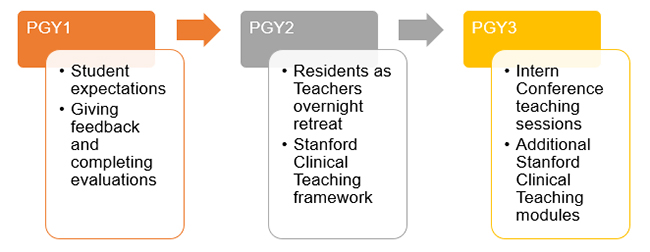Training Overview: Teaching
We believe all of our residents should graduate as skilled educators in order to better serve their future patients, future colleagues, and future learners. All residents participate in an extensive curriculum to develop these skills. In addition, residents with a strong interest in medical education may participate in our generalist pathway with a focus in medical education. This may include further training and scholarship opportunities in curriculum design and medical education research.
All of our residents participate in a strong curriculum aimed to train them as effective teachers in the clinical and non-clinical arenas. Each resident participates in a two-day off-site teaching retreat during their transition from manager to teacher/leader phase of training. Residents continue to grow as educators through participation in:
- Teaching seminars in teacher/leader phase
- Teaching and facilitating conferences – at least two during teacher/leader phase with structured observation and feedback on teaching skills
- Focused evaluations targeted to give feedback on teaching/leadership behaviors from learners (students and interns) – with formal review by core advisor
- Opportunity for other teaching – conferences and morning reports, simulation, procedures, physical exam, students and more
Longitudinal Residents as Educators Curriculum


Formal training in clinical teaching
All residents are trained in a modified version of the Stanford Clinical Teaching Framework, developed by Kelley Skeff at Stanford University.
This training includes training in seven main areas:
- Learning Climate
- Control of Session
- Communication of Goals
- Promotion of Understanding and Retention
- Evaluation
- Feedback, Promotion of Self-directed Learning
All residents participate in a two-day retreat in the second year of training in which they are trained in behaviors that enhance their effectiveness in five of the areas outlined above. These retreats are run by formally trained facilitators in the Stanford Clinical Teaching Framework. Teaching methods used in the retreat include the following: lecture, small group discussion, video observation, role play, goal setting. This retreat is often a highlight of the second year of training. All residents then complete training in the framework in seminars in their third year of training. Student evaluations of residents are specifically designed to provide feedback on behaviors linked to the framework. Residents also participate in the residents as teachers program facilitated by VCU’s office of graduate medical education and the school of medicine. This includes training, which starts as early as intern orientation week.